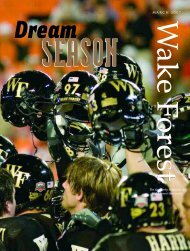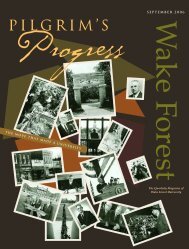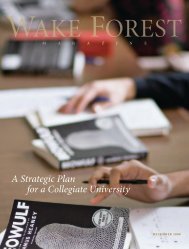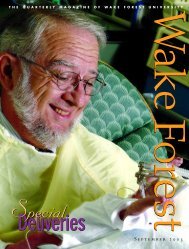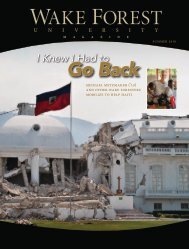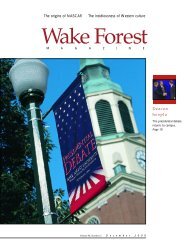Wake Forest Magazine December 2002 - Past Issues - Wake Forest ...
Wake Forest Magazine December 2002 - Past Issues - Wake Forest ...
Wake Forest Magazine December 2002 - Past Issues - Wake Forest ...
Create successful ePaper yourself
Turn your PDF publications into a flip-book with our unique Google optimized e-Paper software.
On the right course<br />
Gordon McCray’s career path<br />
has brought him back to<br />
<strong>Wake</strong> <strong>Forest</strong>.<br />
As a teenager in Deland, Fla.,<br />
Gordon E. McCray (’85) was a<br />
competitive skateboarder. All<br />
the hours he spent making<br />
constant course corrections on<br />
his board prepared him well, it<br />
seems, for the many turns his<br />
career in business and education<br />
would take.<br />
A physics major at <strong>Wake</strong><br />
<strong>Forest</strong>, McCray shifted directions<br />
in his first job to industrial<br />
engineering, then zigzagged<br />
to an MBA degree and<br />
a doctorate in information systems,<br />
before doing a nifty 360<br />
maneuver to a faculty appointment<br />
at his alma mater. Now,<br />
the BellSouth Mobility<br />
Technology Professor of<br />
Business at the Calloway<br />
School of Business and<br />
Accountancy has added a new<br />
twist to his routine: an associate<br />
deanship at the school.<br />
McCray will focus primarily<br />
on corporate relations, curriculum<br />
development, degree<br />
program oversight and the<br />
application of technology at<br />
the school. “Gordon’s commitment<br />
to the Calloway School<br />
and its students is extraordinary,”<br />
said Jack Wilkerson,<br />
dean of the Calloway School.<br />
“He is an outstanding classroom<br />
instructor, a productive<br />
scholar and a thoughtful<br />
leader.”<br />
McCray’s first career course<br />
correction came with his first<br />
job with Brunswick Corp.,<br />
C a m p u s C h r o n i c l e<br />
later called Memtec America.<br />
“I was working at the intersection<br />
of mechanical and chemical<br />
engineering in the design<br />
of manufacturing processes<br />
that were computer-designed<br />
and controlled,” he said. “In<br />
that sort of position in that<br />
kind of environment, it seemed<br />
only natural to cross into information<br />
systems.”<br />
After he finished his MBA<br />
at Stetson University in<br />
Deland, he moved into a management<br />
position, and then<br />
Stetson asked him to teach<br />
part-time; he found that he<br />
enjoyed teaching, so it was on<br />
to Florida State, where he completed<br />
a doctoral degree in<br />
information systems in 1994.<br />
“The college job market<br />
tends to be feast or famine, and<br />
unfortunately, that year it was<br />
famine,” he said. “There were<br />
something like 4.3 people<br />
chasing each available position.”<br />
His high standards compounded<br />
his job-search challenge.<br />
“In terms of size, culture,<br />
faculty and student characteristics,<br />
and the like, I<br />
benchmarked each institution<br />
against <strong>Wake</strong> <strong>Forest</strong>,” McCray<br />
continued. “I decided that in a<br />
perfect world, I’d be back at<br />
<strong>Wake</strong>.”<br />
As good fortune would<br />
have it, the Calloway School<br />
needed an information systems<br />
instructor that year, and it<br />
offered a visiting position to<br />
McCray. The following year he<br />
was offered a tenure-track position.<br />
“The stars aligned, is<br />
about all I can say,” he concluded.<br />
“I was very fortunate to<br />
land in my ideal environment.”<br />
During his first year,<br />
McCray proposed a redesign of<br />
the school’s information systems<br />
curriculum. “At that<br />
time, information systems in<br />
business-school curricula suffered<br />
from two maladies,” he<br />
said. “First, it was often<br />
viewed, wrongly, as only partly<br />
within the purview of business.<br />
There was no real sense of how<br />
information systems can be<br />
leveraged to pursue business<br />
strategy. Second, about the<br />
only computer courses business<br />
schools were offering were<br />
‘tools’ courses such as spreadsheets<br />
and word processing.”<br />
Four years later, McCray<br />
and Associate Professor of<br />
Accounting Yvonne Hinson<br />
developed an information systems<br />
degree program. Two<br />
degree options are offered: a<br />
bachelor of science in information<br />
systems, and a five-year<br />
course of study that combines<br />
the bachelor of science in<br />
information systems with a<br />
master of science in accountancy.<br />
The information systems<br />
faculty has grown to three:<br />
McCray; Denise McManus,<br />
who specializes in telecommunications<br />
and networking; and<br />
Bruce Lewis, who concentrates<br />
on e-commerce and database<br />
systems. Twenty-seven students<br />
graduated with a bachelor’s<br />
degree in information systems<br />
last spring and another<br />
10 are in the master’s program.<br />
“It’s a potent combination–rare<br />
yet sought-after,”<br />
McCray said. “[The degree] is<br />
still pretty new, but so far<br />
companies have responded to<br />
it very well.”<br />
<strong>December</strong> <strong>2002</strong> 9






